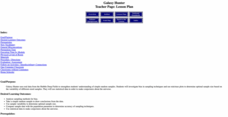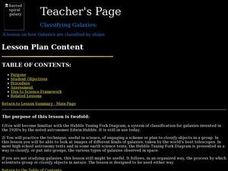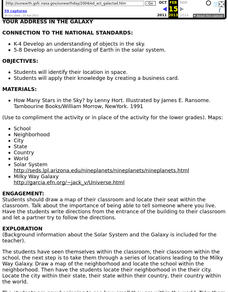Novelinks
The Hitchhiker’s Guide to the Galaxy: Concept Analysis
Considering using Douglas Adams' The Hitchhiker's Guide to the Galaxy as a whole class reading or for book circles? Check out this overview that provides a plot summary, a list of enduring questions raise by and themes addressed by the...
Curated OER
Galaxy Hunter - A Cosmic Photo Safari
Space science stars journey through our night sky and take virtual photos of galaxies to investigate simple random samples. Higher math is used to analyze the data collected. Copy the evaluation/assessment questions onto a handout for...
International Technology Education Association
Telescope as Time Machine
This resource provides an explanation of NASA's GALEX mission and how the space-based telescope can view distant galaxies as they were billions of years ago. The resource also discusses the other aspects of galaxies that GALEX is able to...
Curated OER
The Expanding Universe
In this expanding universe instructional activity, students create a universe with balloons, clothes pins, markers, and more and see what this means for the distance between the Earth and stars. Students follow 6 directions and answer 3...
NASA
Stellar Fingerprints and Doppler Red Shifts
Young scientists observe the spectra of elements and compare that to the Doppler effect. Hook scholars from the beginning all the way to the extension activities in this 5E-format lesson.
Curated OER
Classifying Galaxies
Students classify galaxies by their shape using the Hubble Tuning Fork Diagram.
Curated OER
Galaxies
In this galaxy worksheet, students use the galaxy fact worksheet to complete 18 fill in the blank questions about galaxy shape, sizes, and number of stars.
Curated OER
Your Address in the Galaxy
Students create a business card after researching their location in space and determining their Galactic Address.
Curated OER
Chandra Spies the Longest Sound Wave in the Universe!
In this black hole instructional activity, students use an x-ray image and a sound waves image to determine the size and the wavelength of the sound wave. This instructional activity has 3 problems to solve.
Glynn County School System
Cosmology
The past, the present, and the future ... there's so much to discover about the galaxy. Scholars learn about the creation of the universe, its current structure, and how it is changing. The PowerPoint presentation begins with a...
Virginia Department of Education
Modeling the Big Bang Theory
Young astronomers learn about the Big Bang Theory and redshift through a hands-on activity in the last installment of a three-part series. Participants draw dots on balloons and then inflate them to model how galaxies moved farther apart...
Curated OER
Scale Activities
How do you put something as large as the universe in perspective? Use a series of scale experiments. Classmates collaborate around four experiments to examine the scale of the earth-moon system, our solar system, the Milky Way galaxy,...
K5 Learning
The Sun and the Stars
How are the stars similar to the sun in our galaxy? Learn all about the solar system with a reading excerpt about the sun and the stars. Kids read an informational passage before they answer questions about reading comprehension,...
International Technology Education Association
Singin' the Black and Blues
How does the color of the sky change from blue to reds and oranges to black? An illuminating lesson explains how light travels through different mediums using the sun's light as an example. By examining diagrams and illustrations, pupils...
Curated OER
History of the Universe
Students describe how the universe was formed. In this astronomy lesson, students listen and respond to questions in a PowerPoint lesson that includes various theories about how the universe was created.
Novelinks
The Hitchhiker’s Guide to the Galaxy: Herber Readiness Activity
What does it mean to be alone and isolated? What would you do if you were all alone in a strange place? Kids ponder these questions as they prepare to read Douglas Adams' The Hitchhiker's Guide to the Galaxy.
Adrian College
The Universe
Young scientists create a simulation of Hubble's law. Introducing the Big Bang Theory using balloons and a simple lab worksheet, scholars complete a data table and perform analysis.
K5 Learning
Miss Mitchell's Comet
Maria Mitchell discovered a comet, became the first female astronomer in the United States, and even has a crater on the moon named after her! Learn more about her passion for the stars with an informative reading passage, followed by...
Curated OER
Fact or Fantasy?
Are we alone in the universe? This brief informational text on extraterrestrial theory has been split into seven sections to help scholars practice note taking. They read the statements, underlining key words. Then, using the graphic...
Curated OER
How Many Quasars Are There?
In this quasars instructional activity, students read about how astronomers can detect quasars by their luminosity. Students use a given equation to solve 4 problems including finding quasar magnitude, determining the number of quasars...
Curated OER
Taking the Measure of the Universe
Four fabulous activities immerse amateur astronomers into measuring objects that we cannot handle. The experiences are applied to NASA's Space Interferometry Mission, which will take measurements of planets around stars other than our...
Curated OER
The Milky Way and Beyond
Students consider the scale of the Milky Way Galaxy. In this Milky Way lesson plan, students hypothesize the length of time necessary to cross the Milky Way.
Curated OER
Astronomy Test
In this astronomy test, middle schoolers answer 50 true/false and multiple choice questions about the relationships of the earth, moon, and sun. The test also includes questions about the solar system, galaxies, and the universe. An...
Curated OER
The Big Bang-Hubble's Law
In this Hubble's law instructional activity, learners use data for galaxies which include their distance and speed. Students make a graph to show the distance to each galaxy and the speed of each galaxy. They use their graph to answer 4...

























